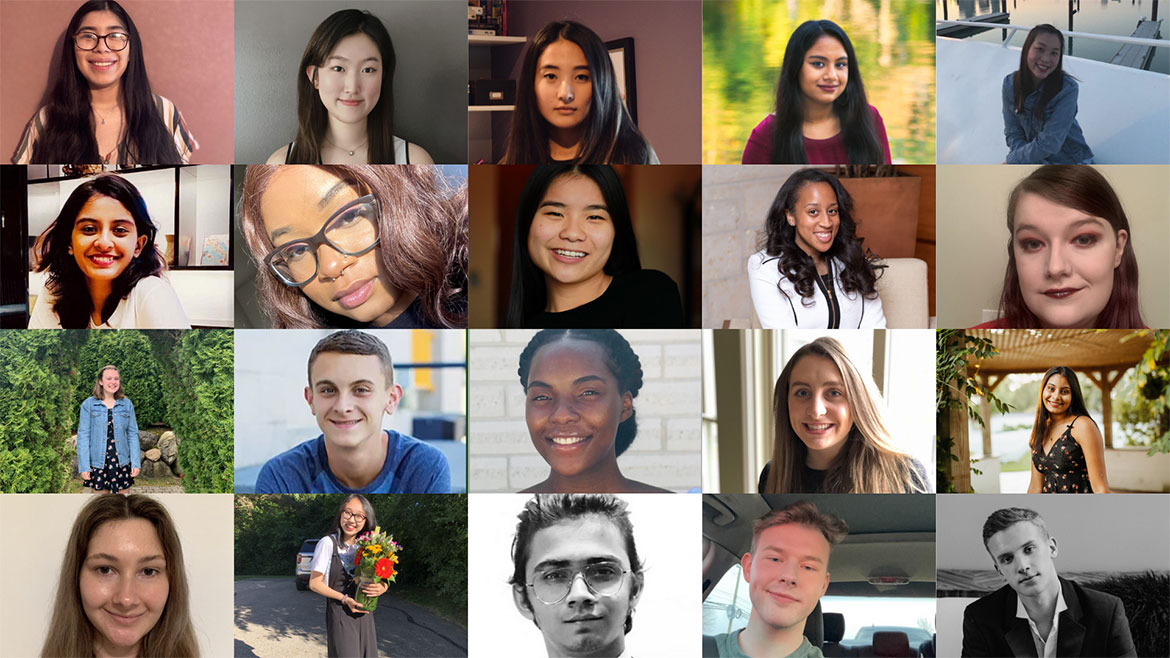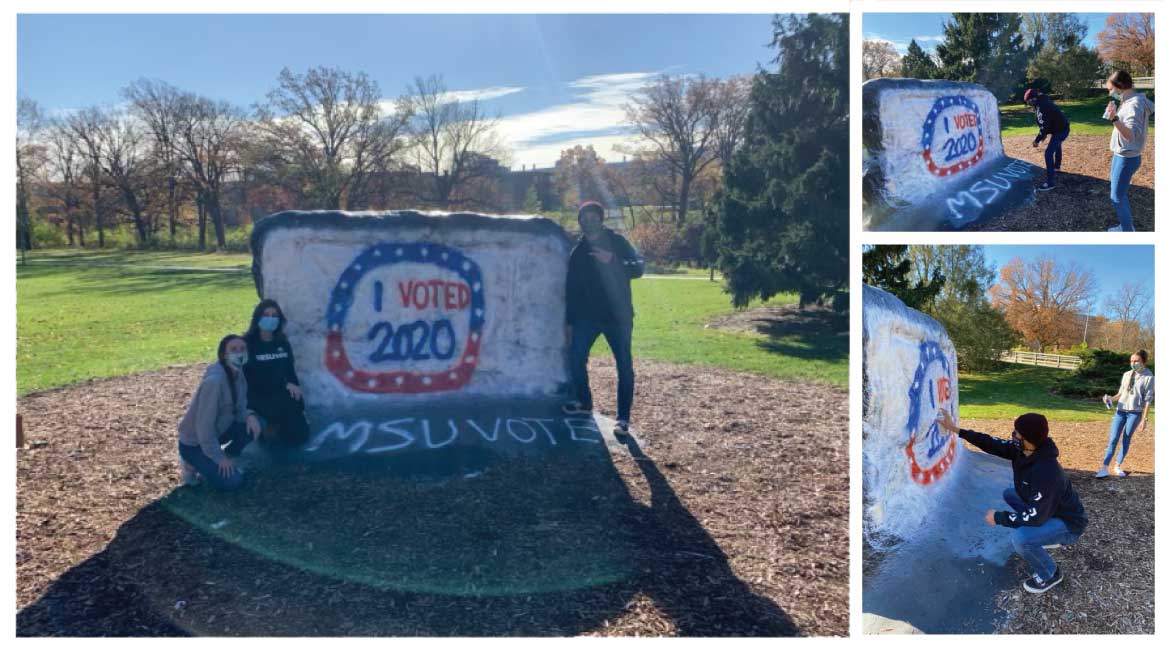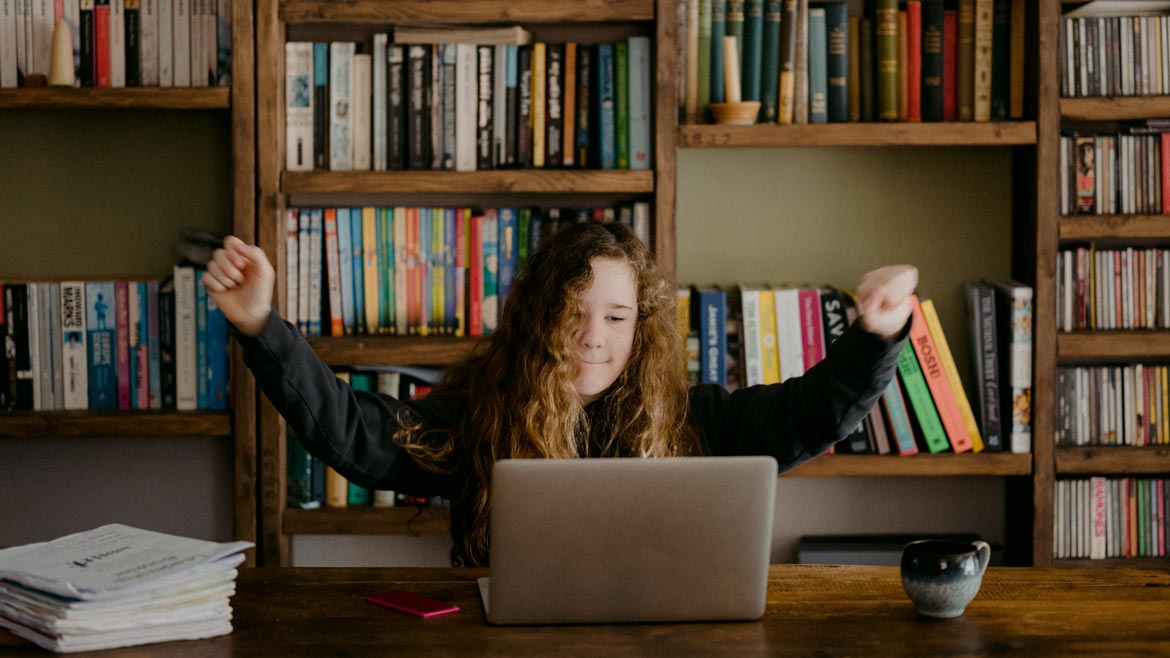Center for Community Engaged Learning Highlights
Students across campus benefited from participating in CCEL-supported cohort programming that highlighted recurring themes of connectedness, resilience, and the sense of belonging that comes from engaging with other Spartans in service. Students who participated in these programs reported feeling connected to other MSU students and to the campus community even while living across the world.
Volunteer Innovation Leaders:
Breaking Down Barriers to
Community-Engaged Learning
This program was generously sponsored by MSUFCU, which has been committed to helping CCEL remove barriers for MSU student volunteers for over a decade. Participating students said they felt more connected to their peers and campus, gained beneficial professional experience as they positively contributed to the goals of a community partner, and created opportunities for future students to volunteer.

“Being a VIL is nothing short of an honor to me. Throughout my time working in this program, I have discovered new abilities of myself, been able to connect with an amazing group of people, and felt connected to campus activities even when I am on another continent! Go Green!”
Ishwari Kapale
Freshman international student
participating from India, serving with Edgewood Village
Ishwari Kapale was one of 20 MSU students, ranging from freshmen to graduate students, who served with community partners as MSU Volunteer Innovation Leaders throughout the spring semester of 2021. CCEL launched this pilot program as we realized students were feeling disconnected from campus and experiencing challenges to finding virtual volunteer opportunities. In addition, the day-to-day pandemic crisis management of some community partners did not allow for much time to think about MSU student volunteer recruitment or dream about the possibilities of virtual volunteer positions. Eleven community-based organizations in Lansing and Detroit hosted the MSU Volunteer Innovation Leaders. Students assisted Michigan’s redistricting efforts with the Lansing Area League of Women Voters, taught virtual cooking courses with Northwest Initiative, created volunteer position descriptions and promotional materials with Lansing Public Schools, and much more.
“Our Innovation Leaders have brought us a sense of confidence and hope for the ’21-’22 school year. With their support, we feel prepared to support MSU volunteers, regardless of what our programming may look like as we continue to navigate COVID.”
Aysia Rodriquez
Communities in Schools
Recognizing participating partner organizations:
- Allen Neighborhood Center
- Capital Area United Way
- City of Lansing, Department of Neighborhoods and Citizen Engagement, Office of Financial Empowerment
- Communities in Schools of Michigan (Elmwood site)
- East Lansing Public Library
- Edgewood Village
- Lansing Area League of Women Voters
- Lansing School District, Bilingual Extended Learning
- NorthWest Initiative
- Pattengill Biotechnical Magnet School
- Soar Detroit
Elections During a Global Pandemic:
MSUvote Innovates for
Effective Virtual Engagement
A global pandemic, social unrest, and presidential election made the work of the MSUvote Campus Coalition a challenge during the fall 2021 semester. In spite of the need to provide voter education and promote democratic engagement in fully remote settings, the campus efforts proved to be extremely effective.
To build community and provide voter education and participation, MSUvote secured multiple grants from the Students Learn Students Vote, the Campus Election Engagement Project, and Ask Every Student national initiatives. This funding allowed MSUvote to host over 25 virtual civic dinners (where students and facilitators were provided with gift cards for meals). Nearly 400 students participated in the virtual civic dinners, creating a sense of community and a place for critical conversations. The topic for the dinners was exploring and discussing National Vote Early Day. Facilitators and participants were faculty, staff, students, and community members.
MSU also partnered with the MSU Student-Athlete Support Services, the Big Ten Network, and the Michigan Secretary of State to host a Voter Registration Virtual Rally. Special guest speakers included Michigan Secretary of State Jocelyn Benson and MSU Men’s Head Basketball Coach Tom Izzo. Several MSU sports teams achieved 100% voter registration and nearly 100 students participated in the rally.

MSUvote hosted a Constitution Day film viewing and discussion. The film 13th is a 2016 American documentary that explores the intersection of race, justice, and mass incarceration in the United States. It is titled after the Thirteenth Amendment to the United States Constitution, adopted in 1865, which abolished slavery throughout the United States and ended involuntary servitude except as a punishment for conviction of a crime. The session was facilitated by Dr. Mieka Smart, assistant professor in the College of Human Medicine.
To meet our goal of increasing 2020 student voting rates to 55 percent, the MSUvote presentations were shared in all incoming freshman orientation sessions to inform students about the registration, voting, and vote by mail efforts.
Student interns and fellows played a key role in setting the goals and plans for the university and in implementing projects and efforts aimed at meeting those goals. Students are represented equally in the coalition and play lead roles on multiple initiatives. MSU hosted 12 student interns and fellows during the fall 2020 semester.
MSUvote student interns, Campus Election Engagement Project (CEEP) Fellows, and Campus Vote Project (CVP) Fellows worked together to provide information about voter registration and absentee/vote by mail to MSU students. They produced informational videos and partnered with local community education efforts sponsored by the East Lansing City Clerk, the Ingham County Clerk, and the League of Women Voters.
To continue building post-election democratic engagement at MSU, the MSUvote Campus Coalition also hosted a panel discussion, held in January 2021, regarding the roles of poll workers and elections officials. This event featured the Michigan Secretary of State, MSU faculty members, student poll workers, and the East Lansing Clerk. It was well attended even though the start date for students was delayed by a week due to the pandemic.
The MSUvote Campus Coalition continues to be led by co-chairs Renee Brown, Director of the Center for Community Engaged Learning, and Suchitra Webster, MSU Community Liaison. The coalition continues to partner with the MSU Office of the President, the MSU Office of the Provost, the Council of Deans, MSU Athletics, the Associated Students of Michigan State University (ASMSU), the MSU Public Radio Station 89FM-WDBM, the Council of Graduate Students, University Outreach and Engagement, registered student organizations, Fraternity and Sorority Life, Student Life, various faculty members (from advertising and political science to law and medicine), and Residence Education and Housing Services (REHS).
MSU Community Engagement Scholars Program Goes Virtual for the 2020-2021 Academic Year
Each year, MSU community engagement scholars engage with community partners on community and economic development projects and programs. In the past, scholars, partners, and program staff spent time together each week for the entire academic year. The program offers a Kick-off and Orientation and a year-end Showcase Event. All aspects of the program were offered virtually in 2020 and 2021.
Scholars serve with their partners for an entire academic year. This year there were ten student scholars and six community partner organizations.
This program is centered on community engagement partnerships and is relational in nature. During this program year, none of the participants were able to meet in person. Many local Lansing projects were being supported by scholars studying remotely from all over the country. The partnership engagement and the cohort learning/development sessions were all held virtually. Scholars spent approximately 15 hours a week engaging with their partners and the scholars and leaders in the program. Scholars partnered with half a dozen local agencies.
- The City of Lansing Department of Neighborhoods and Community Engagement supported a community grant program, developed a COVID 19 resource packet for residents, and developed Community CARES COVID Relief Kits.
- The Edgewood Village Network Center created resident surveys and conducted research related to local and transitional housing shelters in the area. This information was prepared in a report to the organizational leaders and resulted in improved services for residents of Edgewood Village.
- The City of Lansing Public Service Department worked with city staff and residents on emergency flood plans and election engagement.
- The League of Women Voters created communication plans and social media strategies, updated relevant logos, and assisted the organization in its movement to virtual programming during a presidential election and a global pandemic.
- The Capital Area United Way designed volunteering kits to support local organizations around mental health, return to school, interview ready resources, credit repair, and more.
- The Refugee Development Center managed social media campaigns, created a newcomers’ guide, supported the development of a virtual fundraising event, and created an international restaurant guide.

In addition to their partnership efforts, scholars participated in a learning cohort focused on community engagement scholarship and personal and professional development. The cohort was led by a graduate student in the Master’s for Student Services Administration program and the director of the Center for Community Engaged Learning. The role of the graduate coordinator included advising, coaching, curriculum development, and program management. The resiliency, creativity, and flexibility of the students and coordinator in a virtual environment during a global pandemic was outstanding, as evidenced in the partnership outcomes.
The 2020-2021 academic year marked the 5th program year for the MSU Community Engagement Scholars Program. The program is jointly sponsored by the Center for Community Engaged Learning and the MSU Office of the President. The program’s showcase event featured several leaders from across campus, including President Samuel L. Stanley, Jr., M.D., who thanked the students and partners for their dedication and inspirational work.
America Reads
With in-person volunteering suspended, the America Reads/Counts work-study tutoring program at MSU was reworked in 2020 with special considerations given to student safety and access to technology. MSU tutors worked with 11 different community partners around the Lansing area to provide after-school help and mentorship to students who needed it.
One safety measure for virtual tutoring was the “Rule of 3,” which required two MSU students or an MSU student and a staff member from a partner school to be present at each Zoom tutoring session for the purpose of supervision.

Tutors completed reflections after each tutoring session to report on the quality of the sessions as well. Interns Morgan Dobbins and Mandy Curnow used these reflection surveys, as well as data from 17 other America Reads/Counts programs across the United States, to develop suggestions for improvements to the program's structure.
CCEL would like to thank our partners for the America Reads Work-Study Program in Fall 2020 and Spring 2021:
- Cavanaugh Elementary School
- Cumberland Elementary School
- East Lansing High School
- Eastern High School
- Edgewood Village
- Forest View Elementary
- Pattengill Biotechnical Middle School
- Little River Band of Ottawa Indians


